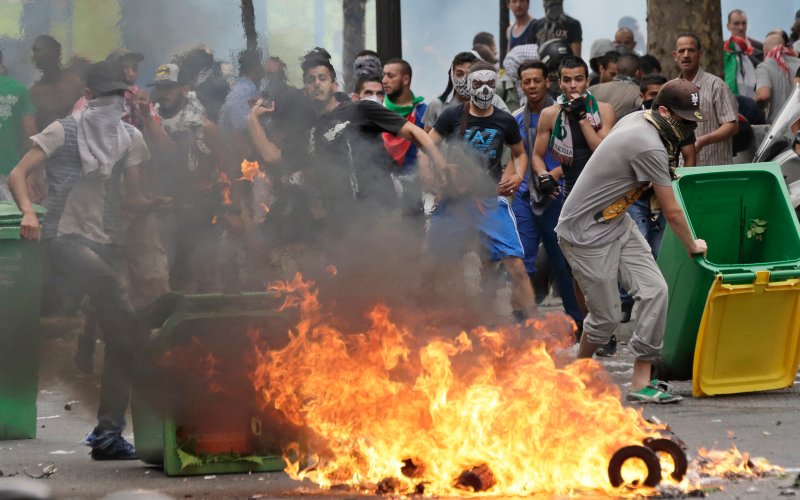Why You Should Blame Iran For The Gaza Conflict
The Islamic Republic has been propping up terror groups on Israel’s border for years. If they are allowed to obtain a nuclear weapon, the results would be catastrophic.
Israel’s ongoing conflict with Hamas in the Gaza Strip has for the umpteenth time exposed Iran as the true source of instability in the Middle East.
At a time when Western powers are working to reach a deal with Iran over its illicit nuclear program, events in Gaza need to serve as a warning of what will happen if they fail.
As the Israeli government has claimed for years, Iran is the main sponsor and one of the main supporters of Hamas and Islamic Jihad, the two terrorist organizations that have fired over 1,600 rockets into Israel over the past few days.
The M-75 rocket, which has been fired repeatedly into Tel Aviv and beyond, is a copy of Iran’s Fajr-5 artillery rocket, manufactured in the Gaza Strip with assistance from Iran’s Revolutionary Guard Corps. The Hamas drones, shot down by the Israeli Air Force, appear to have been the Ababil, an unmanned aerial vehicle designed and manufactured in Iran.
These Iranian weapons were used against Israel at the same time that Iran’s leadership was sitting with the P5+1 in Vienna to negotiate a deal over its nuclear program. While Secretary of State John Kerry sat with Iranian Foreign Minister Mohammed Javad Zarif, Hamas was firing barrages of Iranian rockets into Jerusalem.
For Israel, the message is clear. An Iran that provides, already today, its terror proxies with sophisticated rockets, drones, and other technology could one day hand off a crude nuclear device or dirty bomb to these same terrorists.
In addition, an Iranian regime with nuclear weapons is a regime more willing to take risks and to test the West’s resolve. Deterrence will no longer work.
That is why Israel’s operation in the Gaza Strip needs to be put into the correct context. While the terrorists against whom Israeli soldiers are fighting in Gaza are Palestinian, they are in reality proxies of Iran located on our western border.
Simply put—Israel is fighting Iran.
This is not new.
In Israel, we have watched for decades as Iran built up terror proxies along our borders. Hezbollah, the Shi’ite guerilla organization, is in possession of more than 100,000 rockets and missiles aimed at Israel, and it de facto controls Lebanon. In Syria, Iran and Hezbollah are responsible for ensuring the survival of Bashar al-Assad’s regime, as well as the continued slaughter of innocent civilians.
And then there is Iran’s global terror activity. This month marks the 20th anniversary of the bombing of the AMIA Jewish community center in Buenos Aires that left 85 dead and more than 300 wounded. Since then, countless Iranian plots have been foiled while others, like the 2012 bus bombing in Bulgaria which killed five Israeli tourists, have succeeded.
The four-month extension to the nuclear talks needs to be used to push Iran up against the wall. Sanctions need to remain in place and, if needed, to be even intensified. The P5+1 cannot surrender to Iranian dictations or to pressure that will enable it to retain its nuclear infrastructure.
A deal that does not completely dismantle Iran’s nuclear program will enable the regime to achieve what it has worked for all these years—to become a nuclear power.
Iran currently has about 19,000 centrifuges which, if operated together, can produce a bomb within six to seven weeks. If the deal being negotiated does not lead to the dismantling of these centrifuges, then, while it might take some time, Iran will ultimately get the bomb.
It will wait for the sanctions to be lifted, or for the world to be distracted with another international crisis. And then two or five years from now, it will break out toward a nuclear bomb.
If the centrifuges are taken away, the world will have three years—enough time to know if Iran is building a bomb, to form a global coalition to stop it, and, if needed, to take action.
Now, don’t be mistaken. While we in Israel prefer a peaceful resolution, we do not outsource our security. We will not sit on the sidelines and deposit our fate in the hands of others.
Our track record speaks for itself. In 1981, while the world condemned us, we sent our air force to destroy the Osirak reactor Saddam Hussein was building in Iraq. In 2007, we allegedly did the same in Syria.
We did so because we understood the severity of those threats. We acted because we felt a commitment, not just to ourselves but to the entire world.
An Iran that remains in possession of a viable nuclear program will threaten the world not just with nuclear weapons but also through the terror proxies it supports and finances across the globe.
The latest conflict in the Gaza Strip is just one example of what the world will continue to see if Iran, the real culprit, is not stopped for good.
